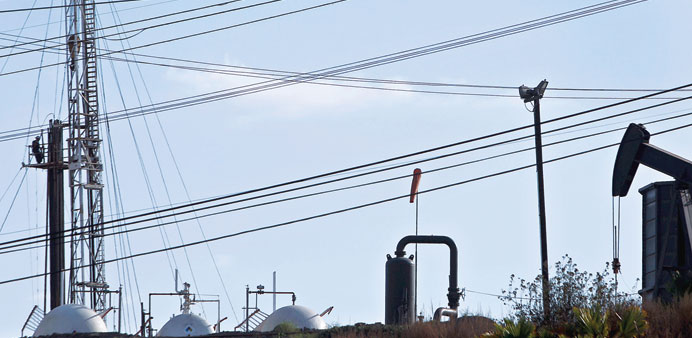A pumpjack operates near a hydraulic fracturing test well at the Inglewood Oil field in Los Angeles (file). Burgeoning US production in shale will soon overwhelm the capacity of domestic refineries and prompt the federal government to rethink its restrictions on crude exports, according to a top Exxon official.
Bloomberg/Chicago
Oil production from North American shale fields will outpace every member of Opec except Saudi Arabia within two years, according to Exxon Mobil Corp, the world’s biggest energy company by market value.
Globally, crude output from shale and similar rock formations that require intensive drilling techniques will increase 11-fold by the end of 2040, led by explorers in the US, Canada and Russia, Exxon said yesterday in its annual long- term forecast for global energy.
Burgeoning US production in shale hotspots such as North Dakota and Texas will soon overwhelm the capacity of domestic refineries and prompt the federal government to rethink its restrictions on crude exports, said Kenneth Cohen, the vice president who oversees Exxon’s lobbying efforts. The Irving, Texas-based company favours lifting the export limits, which date to the 1970s period of Middle East oil embargoes that triggered gasoline shortages.
“The reality is the market has moved from an era of scarcity to an era of abundance - but we’re still saddled with statutes and regulations stuck in a mindset of scarcity,” Cohen said in a telephone interview. “The principle of free trade should underpin not just blueberries and corn, but energy products as well.”
The estimate, assembled by a team of Exxon economists, scientists and engineers, also predicted that carbon dioxide emissions from energy-related sources will peak worldwide around 2030 before beginning a gradual decline. The reduction will stem from increased use of more efficient generators and engines and reduced use of the most carbon-intensive fuels, such as coal and wood, the report said.
Crude extracted from beneath the oceans will expand 150% by 2040, with production from oil-sands deposits quadrupling in that period, according to Exxon, which used a base year of 2010 in its calculations. Shale, deep-water and oil-sands output together will be more than enough to replace declining supplies from older, onshore fields that were drilled decades ago, the report said.
Even with competition from North American shale sources, Opec (Organisation of Petroleum Exporting Countries) will increase its share of the world oil market to 45% by 2040 from about 40% in 2010, according to the report.

